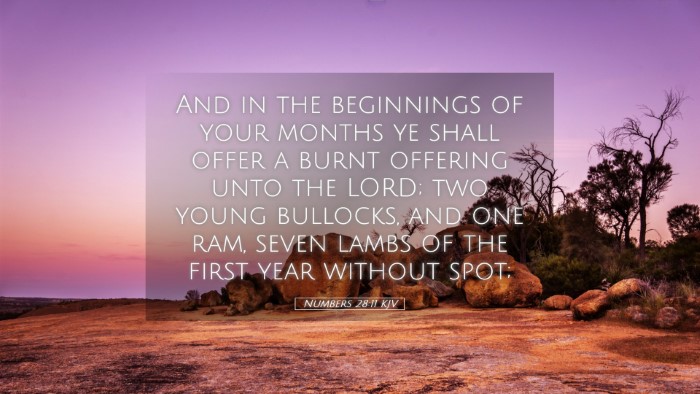Bible Commentary on Numbers 28:11
Numbers 28:11 states:
“And in the beginnings of your months ye shall offer a burnt offering unto the Lord; two young bullocks, and one ram, seven lambs of the first year without spot;”
This verse outlines one of the offerings that the Israelites were commanded to offer to God at the start of each month. The significance of this command can be unpacked through various commentaries.
1. Introduction to Offerings
The practice of offerings is fundamental to the worship of Israel. The offerings represent a response to God’s covenantal relationship with His people, reflecting gratitude, atonement, and devotion.
2. The Monthly Offering
According to Matthew Henry, the monthly offerings were a way to acknowledge God’s providence and the passing of time. This regularity in worship underscores the importance of maintaining a consistent relationship with God and recognizing His sovereignty:
- Remembrance of God's Provision: Each new month was an opportunity to reflect on God's previous provisions and to seek His favor for the coming days.
- Symbolic Renewal: Monthly offerings symbolized a renewal of the covenant, reminding the Israelites of their commitment to live according to God's statutes.
3. The Specifics of the Offerings
Albert Barnes points out the detailed instructions regarding the offerings, highlighting their significance:
- Two Young Bullocks: These were to atone for the congregation’s sins. The two bullocks symbolize the need for ample sacrifice to cleanse the community.
- One Ram: A ram often signifies a male offering representing strength and the recognition of the sacrificial nature of worship.
- Seven Lambs of the First Year: The lambs symbolize innocence and purity, representing the ideal of bringing the unblemished to God.
4. The Importance of Without Spot
Adam Clarke emphasizes the phrase 'without spot,' which serves a crucial theological point. The requirement for animals without blemish is not merely a matter of sacrificial correctness but also symbolizes perfection:
- Foreshadowing Christ: The lambs without blemish point to Christ, the Lamb of God, who was without sin.
- Imparting Holiness: The condition of the offerings reminds the Israelites, and us today, that God desires holiness and purity in our worship.
5. Spiritual Significance of Regular Offerings
The act of regular offerings fosters a routine of dependence on God. Pastors note that this discipline in worship creates a habit of seeking God first in all matters. The structure behind the offerings teaches several lessons:
- Consistency in Worship: Regular offerings encourage believers to cultivate a continuous relationship with God rather than sporadic visits.
- Teaching Future Generations: Observant practices were instrumental in teaching future generations about worship and redemption.
- Community Reflections: These offerings were communal and served as a reminder that everyone shares in both sin and grace.
6. Application for Today
Modern applications of Numbers 28:11 provide insight into how believers can structure their spiritual lives:
- Dedication of Time: Setting aside dedicated time for God each month is an encouragement for believers to seek divine guidance and express gratitude.
- Offering Service: In lieu of animal sacrifices, Christians are called to offer their lives as living sacrifices, which Paul elucidates in Romans 12:1.
- Holiness and Integrity: Just as offerings were to be without spot, believers are reminded to pursue holiness in their lives, reflecting Christ in their character.
7. Conclusion
In conclusion, Numbers 28:11 serves as a profound reminder of the necessity of acknowledgment of God's sovereignty and provision. The appointment of monthly offerings highlights God’s desire for regular communion with His people. Pastors, students, and scholars alike can draw from this practice, recognizing the call to integrate worship into their everyday lives while embodying the principles demonstrated through the offerings. The lessons regarding purity in sacrifice and community involvement remain ever pertinent, encouraging believers to live devoted, holy lives marked by gratitude towards God.


